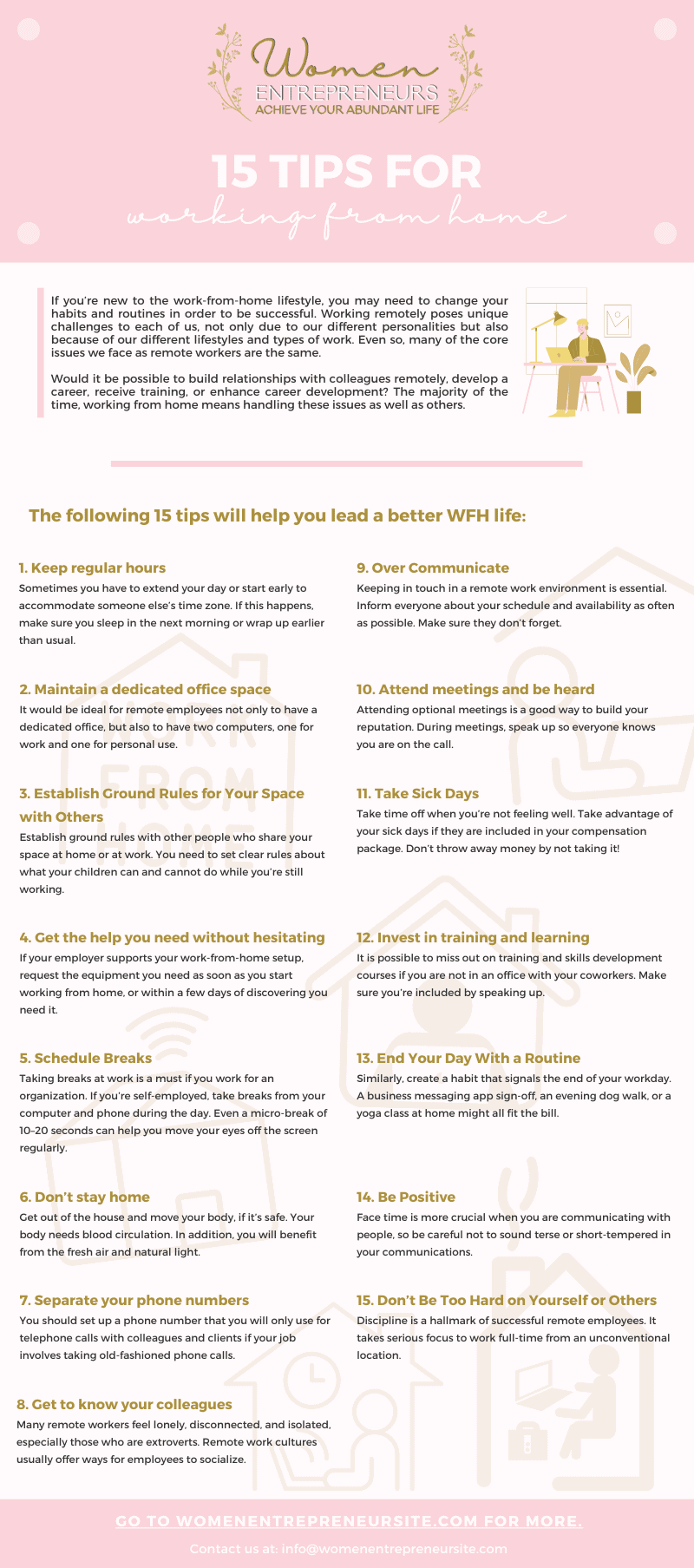When considering the purchase of a convertible 2-in-1 laptop for work, there are several important factors…
Tips for Working From Home

Adapting to a work-from-home lifestyle requires changing habits and routines to achieve success. As each individual has unique personalities, lifestyles, and types of work, remote work poses different challenges. However, many common issues arise for remote workers, such as finding the appropriate time and location to work and creating boundaries between work and personal life.
Developing relationships with colleagues, career growth, training, and professional development are also important considerations for remote workers. To address these challenges, the following 15 tips can help improve productivity and enhance the work-from-home experience.
Tips for Working From Home
1. Keep regular hours
Plan your days and stick to them…most of the time. Most remote workers maintain a work-life balance when they have clear guidelines on when to work and when to call it a day. As a result, remote work has the advantage of flexibility, when it is permitted by the job. Sometimes you have to extend your day or start early to accommodate someone else’s time zone. If this happens, make sure you sleep in the next morning or wrap up earlier than usual.
2. Maintain a dedicated office space
Remote employees should ideally have a separate office and two computers, one for work and one for personal use, to maintain employer security and personal privacy. If a separate room or two computers are not feasible, a dedicated work desk with separate peripherals should be used instead.
3. Establish Ground Rules for Your Space with Others
Clear ground rules should be established when sharing a workspace with others. Boundaries should be set for children’s activities during work hours and coordination of quiet times, meetings, and shared equipment should be arranged with adult co-workers. Sharing schedules can prevent disruptions and help with preparation during work.
GreenForest L Shaped Office Desk
The options for computer desks are more plentiful if your space is limited. In addition to the rectangle computer writing desk, this three-piece L-shaped computer desk fits snugly into every corner, giving you more space for studying, working, and gaming in your bedroom, home office, or entertainment room.
4. Get the help you need without hesitating
If your employer supports your work-from-home setup, request the equipment you need as soon as you start working from home, or within a few days of discovering you need it. Establishing a precedent early on that you will ask for what you need to get your job done comfortably is extremely important. These items might include the right monitor, keyboard, mouse, chair, desk, printer, software, etc. Remote-working organizations often have a budget for home office equipment.
5. Schedule Breaks
Taking breaks at work is a must if you work for an organization. If you’re self-employed, take breaks from your computer and phone during the day. For full-time employees in the US, a lunch break and two 15-minute breaks are standard. Standing up and moving at least once an hour is important for computer work and other sedentary jobs. Even a micro-break of 10–20 seconds can help you move your eyes off the screen regularly.
6. Don’t stay home
Take breaks to move your body and get fresh air and natural light. Whether you work from home or in-person, step outside at least once a day. Consider going to cafes, libraries, or co-working spaces to break up the monotony of being at home.
7. Separate your phone numbers
To manage work-related phone calls effectively, consider creating a dedicated phone number solely for communication with colleagues and clients. You can use VoIP services like Skype or Google Voice without the need for a landline or a separate mobile phone. Having a separate phone number can also help in maintaining a work-life balance.
8. Get to know your colleagues
Many remote workers feel lonely, disconnected, and isolated, especially those who are extroverts. Remote work cultures usually offer ways for employees to socialize. A team messaging app, such as Slack, might allow them to organize meetups for people in the same region or discuss common interests.
9. Over Communicate
In a remote work setting, it is important to stay connected. Regularly update others about your schedule and availability to avoid miscommunication. Notify colleagues when a project or task is completed. While detailed explanations are not necessary, avoid repeating information. Adding humor can help alleviate potential repetition.
10. Attend meetings and be heard
Working remotely will certainly involve video conferences and conference calls. Attending optional meetings is a good way to build your reputation. During meetings, speak up so everyone knows you are on the call. In the end, a simple, “Thank you, everyone. Bye!” goes a long way.
>> Check out these Office Chairs from Amazon
11. Take Sick Days
Use your sick days to take time off when you’re not feeling well, even if you’re self-employed. It can be tempting to keep working, but resting and getting well are important for long-term health and productivity. Don’t waste your sick days if they’re part of your compensation package.
12. Invest in training and learning
It is possible to miss out on training and skills development courses if you are not in an office with your coworkers. You might even miss out on online training courses offered by your company. Although it may seem like a dodged bullet, you might miss out on learning something useful. Make sure you’re included by speaking up.
13. End Your Day With a Routine
Similarly, create a habit that signals the end of your workday. A business messaging app sign-off, an evening dog walk, or a yoga class at home might all fit the bill. Turn on a favorite podcast and shut down your computer. Mark the end of working hours consistently, whatever you choose.
14. Be Positive
In all-remote settings, it is really difficult to read tone in written messages. Face time is more crucial when you are communicating with people, so be careful not to sound terse or short-tempered in your communications.
15. Don’t Be Too Hard on Yourself or Others
Discipline is key for successful remote work. Although it can be challenging to work from an unconventional location, it’s important to remain focused. It’s normal for the attention to drift, so don’t be too hard on yourself if you get distracted. Consider if you would do the same thing in an office setting, and if the answer is no, get back to work. It’s crucial to find a balance between productivity and self-care to avoid burnout.
Conclusion
Decide what works for you above all else. You might need some inspiration from other remote workers who are in the same situation as you sometimes, but sometimes the answer is apparent. You can find supportive communities through your organization’s Slack channel, blogs, or Twitter. Make sure you shake up your routine once in a while.








